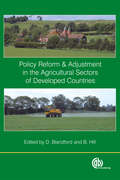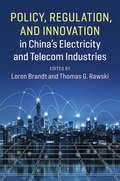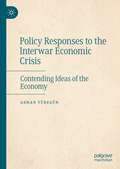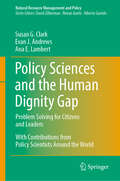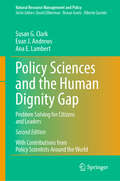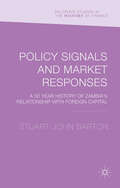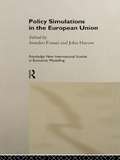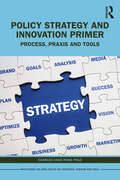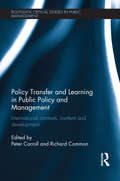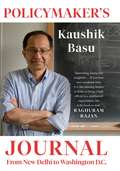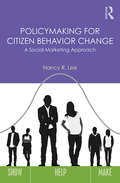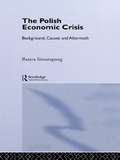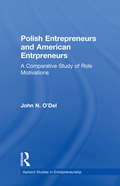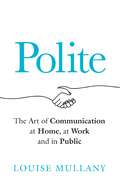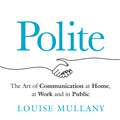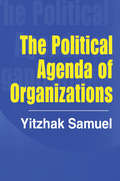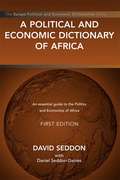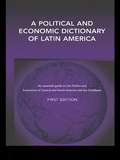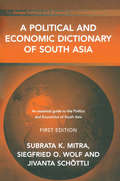- Table View
- List View
Policy Reform and Adjustments in the Agricultural Sectors of Developed Countries
by David Blandford Berkeley HillThis book explores the policy implications of growing pressures for economic adjustment in the agricultural sectors of developed countries. The primary focus is on Europe and North America, but adjustment policies in other developed countries are discussed. Some chapters are based on an international workshop at Imperial College, London in October 2003, and an international symposium in Philadelphia in the spring of 2004.
Policy, Regulation and Innovation in China's Electricity and Telecom Industries
by Loren Brandt Thomas G. RawskiThe scale of China's innovation ambitions inspires worldwide commentary, much of it poorly informed. Focusing on electricity, telecommunication and semiconductors, this book offers a richly detailed account of China's innovation efforts. Massive application of human, policy and financial resources shows great promise, but institutional obstacles, conflicting objectives, ill-advised policies and Soviet-era legacies inject inefficiencies, resulting in a complex mosaic of success and failure in both technical and commercial dimensions. State Grid leads the world in high-voltage power transmission, while domestic semiconductors lag behind the international frontier. Electricity and telecom providers record impressive technical advances, but overinvestment and inefficient operation contribute to high costs and prices. Nuclear power combines technical excellence with commercial weakness. Cost reduction rather than new technology underpins commercial success in solar materials. The book's granular studies look beyond specific technologies to incorporate the policy matrix, regulatory structures and global developments into the appraisal of China's innovation achievements.
Policy Responses to the Interwar Economic Crisis: Contending Ideas of the Economy
by Adnan TüregünThis book is about national economic policy responses to the Great Depression of the interwar period. Taking off from a generally liberal starting point in the 1920s, states diverged greatly in their responses. Some were daring while others remained conservative. The two groups further differed among themselves in both degree and kind. The book gives a certain shape to this messy reality by identifying broad policy patterns (paradigms), and offers an explanation of it which emphasizes the ideational disposition of policy actors while recognizing the context that limits what they can do. More specifically, it argues that the ideas held by rulers and the strategies they consequently developed regarding three major groups of interest – business, labour, and, most critically, agrarians – largely determined economic policy variation across nations.
Policy Sciences and the Human Dignity Gap: Problem Solving for Citizens and Leaders (Natural Resource Management and Policy #58)
by Susan G. Clark Evan J. Andrews Ana E. LambertThis book presents a comprehensive and actionable framework for individuals and leaders seeking to promote human dignity within healthy environments. Rooted in the policy sciences approach, it equips readers with the essential concepts, tools, and skills necessary to address indignity and unhealthy conditions collectively. Despite international commitments and domestic laws advocating for human dignity, a glaring "human dignity gap" persists in numerous regions and problem contexts. This book sheds light on this disparity, examining its manifestations in global environmental change, development efforts, water insecurity, wildfires, human-wildlife conflict, access to public health, and much more. While existing scholarship often focuses on legal rights, the authors emphasize untapped opportunities for everyday citizens and leaders to foster human dignity within their communities and beyond. By offering fresh perspectives, practical concepts, and exercises, this book empowers readers to bridge the performance gap, ultimately enabling the realization of human dignity from the grassroots level. It provides innovative strategies and frameworks to address this pressing global issue, making it an invaluable resource for scholars, policymakers, and concerned citizens alike.
Policy Sciences and the Human Dignity Gap: Problem Solving for Citizens and Leaders (Natural Resource Management and Policy #60)
by Susan G. Clark Evan J. Andrews Ana E. LambertThis book presents a comprehensive and actionable framework for individuals and leaders seeking to promote human dignity within healthy environments. Rooted in the policy sciences approach, it equips readers with the essential concepts, tools, and skills necessary to address indignity and unhealthy conditions collectively. Despite international commitments and domestic laws advocating for human dignity, a glaring "human dignity gap" persists in numerous regions and problem contexts. This book sheds light on this disparity, examining its manifestations in global environmental change, development efforts, water insecurity, wildfires, human-wildlife conflict, access to public health, and much more. While existing scholarship often focuses on legal rights, the authors emphasize untapped opportunities for everyday citizens and leaders to foster human dignity within their communities and beyond. By offering fresh perspectives, practical concepts, and exercises, this book empowers readers to bridge the performance gap, ultimately enabling the realization of human dignity from the grassroots level. It provides innovative strategies and frameworks to address this pressing global issue, making it an invaluable resource for scholars, policymakers, and concerned citizens alike.
Policy Signals and Market Responses: A 50 Year History of Zambia's Relationship with Foreign Capital (Palgrave Studies in the History of Finance)
by Stuart John BartonThe study presents archival evidence to show how President Kaunda raised political and economic exclusivity in Zambia in the early years of Zambia's independence, and how this retarded capital investment. Despite formal reforms and a new government, this institutional mechanism still dominates and constrains Zambia's political economy today.
Policy Simulations in the European Union (Routledge New International Studies In Economic Modelling Ser.)
by Amedeo Fossati John HuttonThe papers in this much-needed collection employ Applied General Equilibrium methodology to address a wide variety of concerns within the European Union. Contributors examine five main policy areas: * international market integration * policy simulations with alternative treatments of factor markets * policies for carbon dioxide abatement * competi
Policy Strategy and Innovation Primer: Process, Praxis and Tools (Routledge-Solaris Focus on Strategy, Wisdom and Skill)
by Charles Chao PhuaPhua focuses on applying the best of corporate strategy and innovation tools and praxis into the policy process with the aim of devising a coherent policy strategy–innovation framework and process. Government and business strategies differ in their operating assumptions and variables, but the strategy process is more similar than is often perceived. Phua debunks the government versus business dichotomy and demonstrates the potential for cross-learning between both domains. Readers will benefit the most by reading this book in tandem with Phua’s other works on strategy also featured in this series. This book is an essential primer for academics, practitioners and learners of public policy, strategy, innovation and applied problem-solving.
Policy Transfer and Learning in Public Policy and Management: International Contexts, Content and Development (Routledge Critical Studies in Public Management)
by Peter Carroll Richard CommonA typical image of the making and administration of policy suggests that it takes place on an incremental basis, involving public servants, their ministers and, to a more limited extent, a variety of interest groups. Yet, much policy making is based on similar policy developed in other jurisdictions and in the major international organizations such as the WTO and the OECD. In other words, significant aspects of nationally developed policies are copied from elsewhere in what is described as a process of policy transfer and learning. Hence, studies of policy transfer have pointed to a distinct limitation in most existing theoretical and empirical explanations as to how policy is made and implemented through their neglect of the role of policy transfer and learning. Moreover, policy transfer is not only a concern of academics, but a growing concern for governments. The latter are concerned to improve the performance of their policy and several have placed a greater, more systematic focus on policy transfer as a means to increasing performance. This book presents a variety of cases from differing national and international contexts that enable a valuable, comparative analysis that is absent from most literature currently available and that suggest a number of exciting research directions with implications for policy making, transference and implementation in the future.
Policy within and Across Developing Nations (Routledge Revivals)
by Stuart S NagelFirst published in 1998, policy WITHIN developing nations includes: (1) Economic policy, such as economic growth without inflation or sectors of unemployment; (2)Technology policy, such as encouraging the ad option of improved technologies for health, energy, transportation, agriculture, manufacturing and the environment; (3) Social policy, such as education facilities, and merit treatment across ethnic groups, genders, age groups, economic classes, and geographical regions; (4) Political policy, such as multiple sources of ideas from different government levels, branches, interest groups, and parties; (5) Legal policy, such as compliance with the law by street people, business people, and government people. Policy ACROSS developing nations includes: (1) International economic policy, such as trade, tariffs exchange rates, and factory relocation; (2) International technology policy, such as patents, copyrights, trademarks, and other aspects of technology transfer; (3) International social policy, such as immigration, refugees, and cross-border ethnic friction; (4) International political policy, such as human rights and the role of sanctions; (5) International legal policy, such as the drug trade, human rights, business transactions, torts, and property rights across national boundaries.
Policymaker's Journal: From New Delhi to Washington D.C.
by Kaushik BasuThis book charts the course of Kaushik Basu&’s career over seven years, as he moved out of the cloisters of academe to the frenetic world of policymaking, first in India as Chief Economic Adviser to the Indian Government and after that as Chief Economist at the World Bank in Washington.The Indian years were a period of high inflation, growth challenges (as the global financial crisis arrived in India), and also a remarkable growth recovery story, with India moving past China&’s GDP growth rate. There were corruption scandals breaking, causing widespread street protests, a lot of late-night decision-making, which one knew would rock the stock market the next day, and getting to know politicians who were outstanding as statesmen in the midst of all this, and also many who were not.The World Bank years weren&’t that close to actual policymaking, but nevertheless breath-taking in their scope. They ranged from interacting with policymakers in tiny remote countries like Samoa to gigantic nations with comparable heft, such as China. It entailed sitting down with leading researchers to compute and announce global numbers on extreme poverty and rankings on how easy it is to do business in different countries (fully aware that there would be calls from irate finance ministers as soon as these were published). And there was the handling of politics within the World Bank, which could actually be as enjoyable as any global economic problem!This book is a revised version of the diary that Kaushik Basu kept for seven years. Revised because he often wrote the diary in a hurry at the day&’s or even week&’s end. He has now inserted some reflections in retrospect, without altering any descriptions of what actually happened.
Policymaking for Citizen Behavior Change: A Social Marketing Approach
by Nancy R. LeeSocial marketing is a discipline unfamiliar to many policymakers, often confused with the more frequently applied and studied fields of social media, behavioral economics, or social change. Social marketing is a growing field and methodology, however, that has been successfully applied to improve public health, prevent injuries, protect the environment, engage communities, and improve financial well-being. Policymaking for Citizen Behavior Change is designed to demonstrate the ways in which social marketing can be an effective and efficient tool to change citizens’ behavior, and how to advocate for and support its appropriate application. Providing a 10-Step Planning Model and examining a variety of social marketing cases and tools, including more than 40 success stories, Policymaking for Citizen Behavior Change is core reading for current policymakers, as well as all those studying and practicing social marketing, particularly in the public sector. It’s also worthwhile supplementary reading for those studying public policy, public administration, environmental justice, public health, and other programs on how to effect social change.
The Polish Dilemma: Views From Within
by Lawrence S Graham Maria K CiechocinskaAlthough much has been written about contemporary Poland, discussions that provide a balanced assessment of the current situation are in short supply. To correct that problem, this book offers a cross-section of intellectual opinion within Poland, including original research and works of synthesis that draw on Polish research and writing that have been, for the most part, inaccessible to scholars outside Poland. The contributors' views avoid the extremes of condemnation or defense of the system and make possible a more complete understanding of present-day realities. Their perspectives are moderated by the fact that, although the authors recognize the need for reform and change, they also take into consideration the great constraints facing all who would confront serious national issues. The discussions range from examinations of social structure and class to evaluations of the significance of the state apparatus in the analysis of policy and assessments of economic performance.
The Polish Economic Crisis: Background, Circumstances and Causes
by Batara SimatupangIn order to understand the dramatic events of 1989 it is necessary to examine the circumstances leading up to them. The Polish Economic Crisis examines the primary factor. The author analyses how the severe recession of the late 1970s and early 1980s intensified the need for economic reform and resulted in the economic slump of the 1980s. Batara Si
Polish Entrepreneurial Law in the Era of the COVID-19 Pandemic: Problems and Challenges (Ius Gentium: Comparative Perspectives on Law and Justice #114)
by Edyta HadrowiczThe outbreak of the COVID-19 pandemic presented Polish legislators with a host of legal dilemmas, the aftermath of which resulted in numerous legislative changes. A significant part of these relate to entrepreneurial law in a broad sense. However, the situation created by the COVID-19 pandemic also had a broader dimension, resulting in the introduction of exceptions as the global norm. Similarly, in the domestic legal order, the actions of public authorities in various forms (restrictions, limitations, and ultimately the Lockdown), as well as non-legislative legal activity gave rise to many problems in Poland and have been the subject of various assessments. Hence, the book analyses the legal situation of entrepreneurs in the era of the COVID-19 pandemic both in terms of the amendments and changes introduced and the new regulations, commonly referred to in the public sphere as "covid laws" or "anti-covid shields". Therefore, the book assesses the legal solutions and the level of legislative technique in the broadly understood entrepreneurial law. It focuses on the solutions introduced by Polish legislators and seeks to answer the following questions: to what extent did the relevant public authorities appropriately respond to the threats posed by the pandemic, and did they effectively provide legal protection for entrepreneurs?
Polish Entrepreneurs and American Entrepreneurs: A Comparative Study of Role Motivations (Garland Studies in Entrepreneurship)
by John O'DelFirst published in 1997. Routledge is an imprint of Taylor & Francis, an informa company.
Polite: The Art of Communication at Home, at Work and in Public
by Louise MullanyThe first ever mass-market book on politeness and the important role it plays in our work, relationships and lives, from professor and pioneer of Politeness Theory, Louise MullanyAre women really more polite than men?What is the best way to apologise?And when is it OK to swear?Politeness rules our day-to-day lives, whether it's speaking to colleagues about issues at work, dealing with difficult family members or wondering if you should eat the last piece of pie. For years, Professor Louise Mullany has been examining the prevalence and power of politeness in our everyday speech and actions, and discovering what this says about us.In Polite, Louise shows how the unseen science of politeness governs everything we do, from what we say to how we act, and reveals how a better understanding of the rules and norms of politeness can help us in all aspects of our work, leisure and home lives.And, in doing so, she answers the age-old question... are politeness standards really declining?
Polite: The Art of Communication at Home, at Work and in Public
by Louise MullanyThe first ever mass-market book on politeness and the important role it plays in our work, relationships and lives, from professor and pioneer of Politeness Theory, Louise Mullany'Fascinating and insightful. I'm grateful to have read it, and pleased to have learnt so much in the process. I would - politely - encourage you to do the same.' Jon McGregorAre women really more polite than men?What is the best way to apologise?And when is it OK to swear?Politeness rules our day-to-day lives, whether it's speaking to colleagues about issues at work, dealing with difficult family members or wondering if you should eat the last piece of pie. For years, Professor Louise Mullany has been examining the prevalence and power of politeness in our everyday speech and actions, and discovering what this says about us.In Polite, Louise shows how the unseen science of politeness governs everything we do, from what we say to how we act, and reveals how a better understanding of the rules and norms of politeness can help us in all aspects of our work, leisure and home lives.And, in doing so, she answers the age-old question... are politeness standards really declining?'A must-read for anyone interested in becoming a more effective communicator.' Michael Haugh, The University of Queensland
Political Activism and Basic Income Guarantee: International Experiences and Perspectives Past, Present, and Near Future (Exploring the Basic Income Guarantee)
by Richard K. Caputo Larry LiuThis edited volume brings together international and national scholars and major activists leading or spearheading basic income guarantee political initiatives in their respective countries. Contributing authors address specific issues about major efforts to influence public policy regarding basic income guarantee, such as: who were the main advocates and thought leaders involved in support of such legislative initiatives; what were the main organizational and framing strategies and tactics used to influence public opinion and elected officials to support the idea of and policies related to basic income guarantee; what were the major obstacles they faced; and what practical and theoretical lessons might be learned from past and contemporary actions to affect social policy change regarding basic income guarantee and related measures to guide the efforts of activists and public intellectuals in the 2020 and 2024 election cycles.
Political Advertising in the United States
by Michael M. Franz Travis N. Ridout Erika Franklin FowlerPolitical Advertising in the United States examines the volume, distribution, content, and effects of political advertising in congressional and presidential elections. The book considers the role of television ads using extensive data on ad airings on local broadcast stations. It also analyzes newly available data on paid digital ads, including ads on Facebook, Instagram, Google, and YouTube. The book covers the role of outside groups in airing ads, including the rise of dark money groups and gaps in existing federal campaign finance laws around transparency of outside group spending. The authors consider how ad sponsors design and target ads. They also review the positive and negative implications of an electoral system where billions are spent on paid advertising. With detailed analysis of presidential and congressional campaign ads and discussion questions in each chapter, this accessibly written book is a must-read for students, scholars, and practitioners who want to understand the ins and outs of political advertising. New to the Second Edition • Covers the spending, content, and tone of political advertising in the 2016 and 2020 presidential elections and the 2018 midterms, looking ahead to 2022 and 2024. • Addresses the interference of foreign actors in elections and their connection to political advertising. • Expands the discussion of digital political advertising and incorporates this topic into every chapter. • Adds a new chapter specifically addressing digital ad content and spending. • Includes data from the Facebook, Google, and Snapchat ad libraries and explores the role of these companies in regulating the sale of political advertising. • Incorporates new data on the effects of race and gender in advertising, including what is known about the way in which advertising may activate prejudicial attitudes.
The Political Agenda of Organizations
by Yitzhak SamuelIndividualism and collectivism, egoism and altruism, are interwoven threads that make up the social fabric of all organizations. In consequence, political behavior is an integral part of organizational life. These two interconnected characteristics of human behavior--conformism and opportunism--account for most of the actions and interactions that take place in organizations every day.This volume examines all kinds of organizations from a political perspective, analyzing them in terms of social power and politics. It presents several theories of power and compares them as it scrutinizes the political layout of organizations. For ease of understanding, the book applies the language of political games to describe organizational politics in terms borrowed from the realm of sports, such as contesters, playgrounds, encounters, rules of the game, strategies and tactics, scores, and victories and defeats. It thoroughly analyzes the concepts of social power and social influence from various points of view.Samuel outlines the variety of political games that are played in the realm of organizations, listing nine types of games in which individual level politics, group level politics, and organizational level politics take place. While scrutinizing the political layout of organizations, he also demonstrates how major issues dealt with through processes of decision-making turn into political agendas within organizations. He addresses the issue of managerial politics, drawing upon research that shows how managers influence their subordinates, and how executives conduct power struggles and political maneuvers to defend their lucrative positions.The Political Agenda of Organizations is an enlightening analysis of the power and influence in business organizations and will be of interest to sociologists and other social scientists as well as students of management and business administration.
Political and Economic Analysis of State-Owned Enterprise Reform (China Perspectives)
by Huiming ZhangIn revisiting the forty year history of reforms to China’s state-owned enterprises (SOE), the book assesses the experiences of this process of reform and scrutinizes how this has helped advance the country’s economy overall.The author finds that China’s SOE reform not only commits to institutional innovation within the corporation in terms of operating mechanisms, management structure, legal organization and the economic system of the enterprise; but that it is also underpinned by a series of policies that highlight an increasing market orientation. The measures have given rise to a benign interaction between enterprise reform and market development, while switching the SOE’s role from appendages of government organs under a planned economic system to more autonomous entities that integrate public ownership and the market economy. In this regard, SOE reform’s success in constructing a modern enterprise system serves as the micro-foundation and core of an improved socialist market economic system.The book will appeal to academics and students interested in political economy and the Chinese economy, with particular reference to SOE reform and the recent economic transition in China.
A Political and Economic Dictionary of Africa
by David SeddonThis invaluable Dictionary provides an essential guide to the politics and economics of the African continent. Each individual entry provides clear and concise information, and entries are fully cross-referenced to enhance the book's usability. Organizations listed include contact details wherever possible. Key features* Provides authoritative up-to-date information on a region that is changing fast, and for which reliable data is often hard to locate* Each country's recent history and economy are described and analyzed in separate essays. Entries include: Apartheid, Central African Republic, Christianity, Colonialism, Development Aid, Genocide, Great Lakes, International Monetary Fund, Languages, Nelson Mandela, Mining, Tobacco, Uganda. Countries covered in this voume include: Algeria, Angola, Benin, Botswana, Burkina Faso, Burundi, Cameroon, Cape Verde, Central African Republic, Chad, Comoros, Democratic Republic of the Congo, Republic of the Congo, Côte d'Ivoire, Djibouti, Egypt, Equatorial Guinea, Eritrea, Ethiopia, Gabon, Gambia, Ghana, Guinea, Guinea-Bissau, Kenya, Lesotho, Liberia, Libya, Madagascar, Malawi, Mali, Mauritania, Mauritius, Morocco, Mozambique, Namibia, Niger, Nigeria, Rwanda, São Tomé and Príncipe, Senegal, Seychelles, Sierra Leone, Somalia, South Africa, Spanish North Africa (Ceuta and Melilla), Sudan, Swaziland, Tanzania, Togo, Tunisia, Uganda, Zambia and Zimbabwe.
A Political and Economic Dictionary of Latin America
by Peter CalvertThis Dictionary provides an impartial and valuable background to the Latin American region, vital for anyone interested in the current affairs, recent history and economy of this vast area. Entries provide definitions of terms, concepts, names and organizations key to discussions of Central and South America. Covering some 48 countries and territories, this volume offers a unique insight to the political and economic dimensions of this diverse region.
A Political and Economic Dictionary of South Asia: An Essential Guide To The Politics And Economics Of South Asia
by Subrata K. Mitra Jivanta Schottli Siegried WolfThanks to its emerging markets, nuclearization and the internet revolution, South Asia is increasingly at the forefront of current affairs. This invaluable reference source seeks to make the region accessible to business travellers as well as to the general reader. The range of subjects to be covered includes major political processes and events of South Asia (elections and electoral politics, political slang, political parties, diplomacy and territorial divisions), domestic and foreign policy, key personalities, political and economic institutions, sub-national groupings and units (regions, cities, provinces and rural entities), ethnicity and identity, and legal systems (laws and court cases). Key features: * Terms, which are frequently misunderstood in the political and economic processes of South Asia, are explained clearly and succinctly * More than 1,000 entries, covering the key debates, issues, concepts and institutions. Entries include: Bharatiya Janata Party (BJP), Caste System, Corruption, dalits, Electoral System, Federalism, Hindu-Muslim relation, India-US Relation, Kashmir, Liberation Tigers of Tamil Eelam (LTTE), Nuclearization, Privatization, Reserve Bank of India, Sikh, Untouchability, Urbanization, Atal Behari Vajpayee. Countries covered in this volume include: Bangladesh, Bhutan, India, Maldives, Nepal, Pakistan and Sri Lanka.
